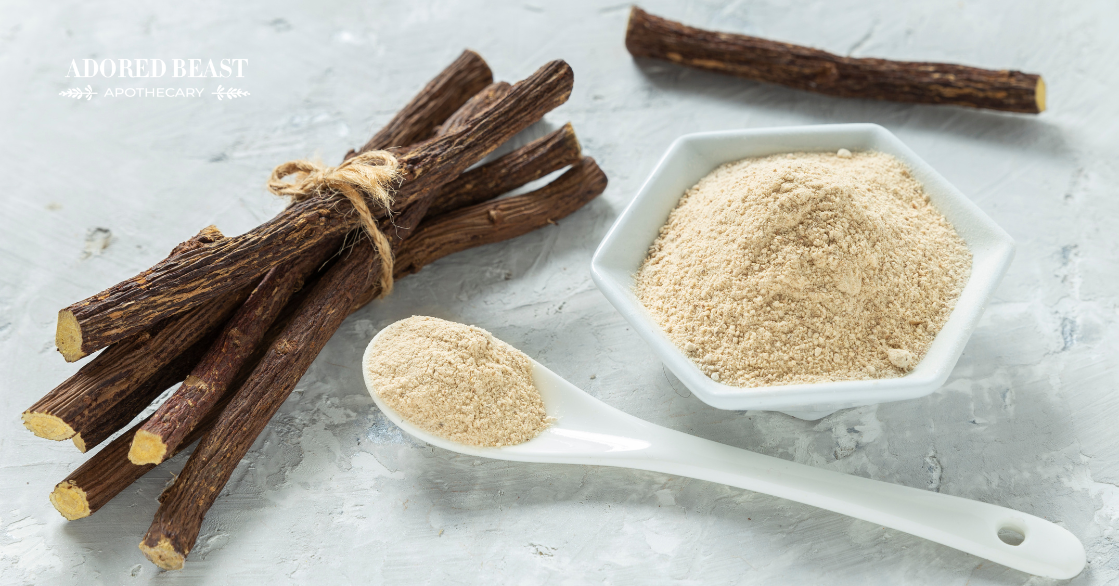I’ve been highlighting some of my favorite herbs lately and today, we’re talking licorice root for horses!
This medicinal herb is widely used with horses, but there are some things you need to know to use and source it to reap all the benefits.
Licorice Root
Licorice root (Glycyrrhiza glabra) is native to southern Europe and some parts of Asia. It’s been used for at least 3000 years, as far back as Ancient Greece in the 3rd century. The indigenous people of the area most likely used it long before this. It has a wide range of medicinal uses in horses. It is particularly well-known for its anti-ulcer effects for equines.
The benefits of this unassuming plant are numerous, and it is used for many different things. Here are some of the most well-known reasons it is used, both in human and animal healthcare:
- expectorant (helps move mucous out of the body, especially the lungs)
- demulcent (reduces gastric acid activity to help heal ulcers)
- anti-inflammatory (systemic effects on the mucosal (epithelial) linings of the body eg. gut, lungs, bladder, organ tubules, etc.)
- laxative (indicated for impaction colic)
- spasmolytic (especially with coughing and colic)
- antitussive (cough relief)
- antimicrobial (especially for re-balancing the gut flora)
- antiviral (reduction of symptoms during viral illness)
- hormone balancer (estrogen in mares)
- liver disorders such as hepatitis and jaundice (Chinese medicine)
- anti-convulsive
- anti-cancer
Scientific Studies on the Benefits of Licorice Root
A large meta-analysis on licorice root was published in the Textbook of Natural Medicine in 2020. It outlined the many benefits of licorice root. Below are the most significant applications for our equine friends:
- Gastric Ulcers – DGL has been shown in numerous studies to treat gastric ulcers with a significant reduction in ulcer size. Complete healing also occurred in 44% of the patients receiving DGL. There were also some studies showing that against ulcer drugs and antacids, DGL was shown to be more effective in the therapy for peptic ulcers.In a study of chronic duodenal ulcers in 874 patients, DGL was comparted to cimetidine and antacids, the DGL group had fewer relapses and the researchers posed that it was a superior treatment for ulcers because of its low toxicity.
- Obesity and Metabolic Syndrome – studies showed a reduction in body mass which was most significant in women. It also improved blood glucose control.
- Inflammatory Disease – DGL abd whole licorice root could be used to treat all types in inflammatory conditions since it is classified as an adaptogenic herb. It has been shown clinically to enhance the action of prednisone and corticosteroids, potentially reducing the dosage needed for these drugs which have significant negative side effects. It has also been shown to be effective in the treatment of rheumatoid arthritis, reducing the need for NSAID medications which can also cause ulcers.
- Skin Disease – topically, it has been shown to be more effective than topical hydrocortisone for skin diseases such as eczema, allergic dermatitis and psoriasis.
- Anti-Microbial – licorice extracts have been shown to have anti-bacterial activity against pathogenic bacteria including H. pylori, Staphylococcus and Candida albicans which are associated with gut and skin diseases in mammals when they get out of balance.
- Much much more! Check out the full study (link below) or more of licorice root’s amazing medicinal abilities!
*Meta-Analysis Reference: National Library of Medicine – Textbook of Natural Medicine, 2020
Sourcing Licorice Root for Horses
When it comes to licorice root for horses, you want to make sure you’re getting the best!
First, be sure that all herbs that you give your horse are either certified organic or wild-crafted for the best quality and medicinal properties.
Next, source in an extracted deglycyrrhizinated format, also known as DGL. What the heck does that mean? Deglycyrrhizinated licorice root has gone through a process where the glycyrrhetinic acid (or glycyrrhizin) has been extracted from the herb. Glycyrrhizin has been shown in scientific studies to have side effects such as dysregulation of blood pressure and electrolytes, particularly increased sodium and decreased potassium. Using DGL is a safe way for animals with any issues in this area to take this herb and still get all the benefits without the side effects.
You can find a supplement containing liquorice root or get it on its own. For both the whole herb powder or DGL powder, give 2-3 tsp per 500kgs of body weight. DGL is best used for horses with insulin resistance, PPID, or for sport horses.
There are many reasons to add liquorice root for horses to your healthcare regime. It’s a valuable herb for any first aid kit, and can be beneficial for regular use in many, many cases.












